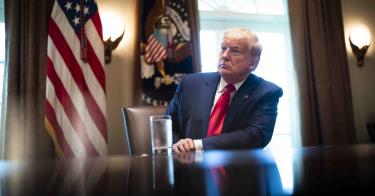The battle of where the Trump administration should set fuel economy mandates for new vehicles turned into a real Goldilocks situation. Finding just the right amount is tricky.
When the Obama administration proposed a 54.5 mile-per-gallon target for model year 2025, automakers said it was way too stringent and would cripple them. When the Trump administration proposed freezing the standard, automakers said they wanted a higher standard.
So did the administration strike the right balance by increasing efficiency by 1.5% annually? Not exactly.
To be sure, the new rule is a marked improvement from the previous administration. But policymakers should jettison fuel economy standards altogether.
Fuel economy standards are a relic of the past. It’s been more than 40 years since the Energy Policy and Conservation Act charged the federal government with establishing corporate average fuel economy (CAFE) standards for cars and light trucks. Policymakers endorsed government-mandated efficiency under the false notion that the world was running out of oil.
Not that the mandates made sense back then. They didn’t. Policymakers should have trusted price signals to guide investments in alternative fuels and technologies. However, they make even less sense today now that we have an abundance of oil.
Buying a car is a ceremonious event for families. But it’s also a costly one. The average cost of a new car is over $36,000. Fuel economy mandates make it worse by increasing the up-front price of new vehicles. The National Automobile Dealers Association estimated that the Obama-era targets of 54.5 miles per gallon by model year 2025 would have increased the average price of a new vehicle by $3,000.
The higher prices set off a chain of decisions by potential car buyers and car owners in the new and used vehicle market. Mandates that drive up the sticker price by thousands of dollars will price buyers out of the market.
Higher prices for new cars increase demand for used vehicles, causing the price of used vehicles to increase as well. These higher prices ripple throughout the vehicle market, affecting fleet turnover and hurting consumers.
Proponents of fuel economy mandates argue that families will be better off financially by saving money on gas over time. The Obama administration estimated that gas prices would be $3.87 per gallon in 2025, increasing to $4.24 per gallon by 2040 when justifying their CAFE standards.
These projections may come nowhere close to matching up with reality. As we’ve seen recently, social distancing and travel restrictions have resulted in a significant decrease in oil use. Gasoline demand is at a nearly 30-year low.
Even before the coronavirus pandemic, drivers were saving a lot of money at the pump as the U.S. crude oil production skyrocketed. That is to say, lower prices at the pump means there is less value to higher fuel economy for consumers.
The fact of the matter is, we can’t rely on projections 20 years into the future to know if consumers are going to be better off when we don’t know where gas prices will be 20 weeks from now.
Even if drivers end up saving money in the end, there are significant non-monetary costs that families incur. The paternalistic view of federal intervention in fuel economy ignores the trade-offs and budget constraints that families face and the preferences they hold. Consumers value other attributes such as vehicle size, engine power, torque and safety.
If consumers value saving money on gasoline over other vehicle characteristics, they will choose to purchase more fuel-efficient cars. Automakers will meet that demand without a federal mandate.
Yet it’s clear from sales data that many families prefer these features over fuel economy. Out of all of the cars, trucks, and SUVs sold in 2018, the top three selling vehicles were all trucks (Ford F Series, the Chevrolet Silverado, and the Ram Pickup). In fact, light-truck sales captured a record 69% of the U.S. market in 2018 while car sales fell to 31%, down from 50% in 2013.
CAFE standards aren’t an effective climate strategy either. The global temperature impact would be practically immeasurable. Even the Obama administration’s more stringent standards would have abated less than two-hundredths of a degree Celsius of warming by 2100, by their own estimate.
Lost in the tussle between the auto industry and both the Obama and Trump administrations is what’s best for the consumer. Consumers should have the freedom to buy the vehicle of their choice. Policymakers will get it “just right” when they scrap CAFE entirely.
This piece originally appeared in The Detroit News




